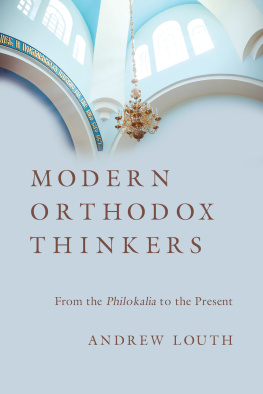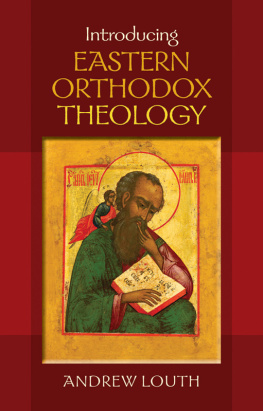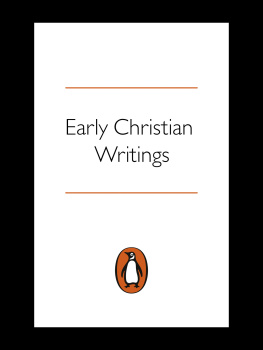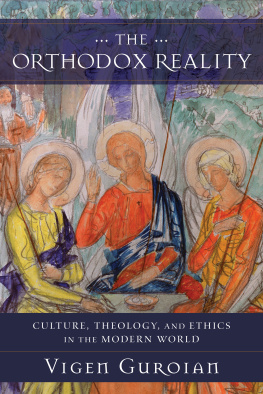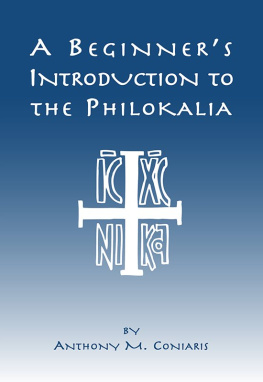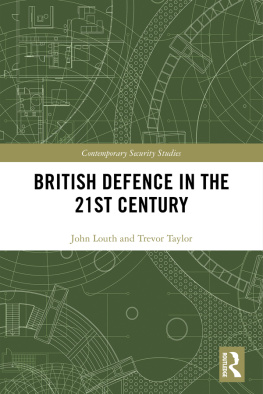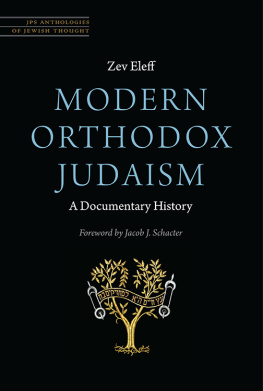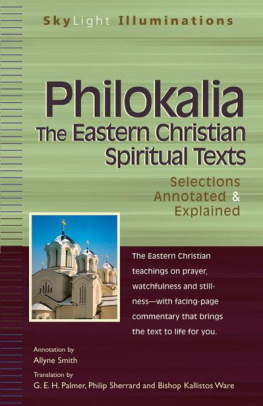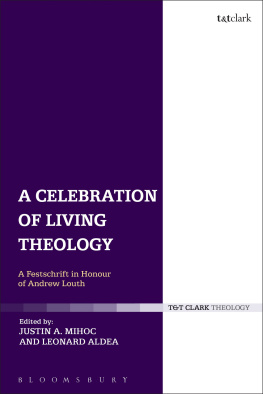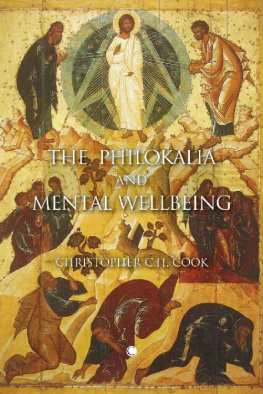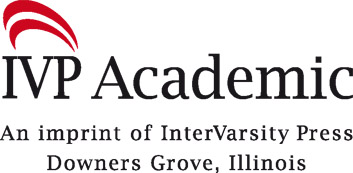MODERN
ORTHODOX
THINKERS
From the Philokalia to the Present
ANDREW LOUTH
For Anna
InterVarsity Press
P.O. Box 1400, Downers Grove, IL 60515-1426
ivpress.com
2015 by Andrew Louth
Published in the United States of America by InterVarsity Press, Downers Grove, Illinois, with permission from the Society for the Promotion of Christian Knowledge, London, England.
All rights reserved. No part of this book may be reproduced in any form without written permission from InterVarsity Press.
InterVarsity Press is the book-publishing division of InterVarsity Christian Fellowship/USA, a movement of students and faculty active on campus at hundreds of universities, colleges and schools of nursing in the United States of America, and a member movement of the International Fellowship of Evangelical Students. For information about local and regional activities, visit intervarsity.org.
Unless otherwise noted, Scripture quotations are translated by the author. Extracts marked AV are taken from The Authorized Version of the Bible (The King James Bible), the rights in which are vested in the Crown, and are reproduced by permission of the Crowns Patentee, Cambridge University Press. Extracts marked RSV are taken from the Revised Standard Version of the Bible, copyright 1946, 1952 and 1971 by the Division of Christian Education of the National Council of the Churches of Christ in the USA. Used by permission. All rights reserved.
ISBN 978-0-8308-9962-3 (digital)
ISBN 978-0-8308-5121-8 (print)
This digital document has been produced by Nord Compo.
Illustrations
Preface
This book is a revised version of public lectures given in the academic years 2012/13, 2013/14, at the Amsterdam Centre for Eastern Orthodox Studies (ACEOT), during which time I was Visiting Professor for Eastern Orthodox Theology at the Vrije Universiteit, Amsterdam: ACEOT belongs to its Faculty of Theology. The final book owes a great deal to the encouragement of those who attended and their questions and observations. Many other people helped me form my ideas: Deacon Michael Bakker, the director of ACEOT, Fr John Behr, with whom I have had many discussions of issues connected with the book, likewise Brandon Gallaher. I was helped (and encouraged) on particular chapters by Avril Pyman-Sokolova (especially on Fr Pavel Florensky), Vladimir Cvetkovi (on St Justin Popovi), Denise Harvey (on Philip Sherrard), Marilyn Wood (on Mother Thekla), Fr Serafim Aldea (aka Leonard Aldea: especially on Fr Sophrony, but on others, too). On matters Greek, I have been helped (though they may not be aware of this) by Niki Tsironi, Fr Andreas Andreopoulos, Sotiris Mitralexis, and my research student at ACEOT, Fr Alexandros Chouliaras (who has also helped with books from Greece). There are other debts that go back much further, not least to Metropolitan Kallistos. One person in particular read all the lectures, asking annoyingly pertinent questions, and then all the chapters, removing asperities and unclarities: my friend, Anna Zaranko, to whom the book is dedicated.
A word should perhaps be said about transliteration of Greek and Russian words and names: it is inconsistent, as everyone always confesses. I think I have mostly used forms that would not look too outlandish in English, but have indulged my pet hates.
Andrew Louth
Feast of St Anastasia, Curer of Wounds
Abbreviations
Conf. | Augustine, Confessions |
ECR | Eastern Churches Review |
ep. | epistle |
ET | English translation |
GOTR | Greek Orthodox Theological Review |
Haer. | Irenaeus, Against Heresies |
Hist. eccl. | Eusebius, History of the Church |
Hom. Exod. | Origen, Homily on Exodus |
Ign. Eph. | Ignatios of Antioch, To the Ephesians |
Ign. Smyrn. | Ignatios of Antioch, To the Smyrnaeans |
IJSCC | International Journal for the Study of the Christian Church |
Irn. | Irnikon |
ITQ | Irish Theological Quarterly |
JECS | Journal of Eastern Christian Studies |
LXX | Septuagint |
Or. Bas. | Gregory the Theologian, Oratio in laudem Basilii |
PG | Patrologica graeca, ed. J.-P. Migne; 162 vols (Paris, 185786) |
RHR | Revue dhistoire des religions |
RSPT | Revue des sciences philosophiques et thologiques |
SC | Sources Chrtiennes (Paris, 1943) |
SSTS | Studies Supplementary to Sobornost |
SVTQ | St Vladimirs Theological Quarterly |
WCC | World Council of Churches |
Introduction
Various presuppositions or intuitions lie behind this book. The first, which affects the scope of the work, is that the publication of the Philokalia in Venice in 1782 can be seen, at least in retrospect, to mark a kind of watershed in the history of modern Orthodox theology. Not all Orthodox theology after that date is marked by the Philokalia; indeed most academic theology in Greece and Russia seems to have been quite unaffected by it (at least until very recently). In what way was the Philokalia a watershed? Very briefly, because it suggested a way of approaching theology that had at its heart an experience of God, an experience mediated by prayer, that demanded the transformation of the seeker after God; it is an approach that shuns any idea of turning God into a concept, a philosophical hypothesis, or some sort of ultimate moral guarantor. Furthermore, it sought to return the living of the Christian life (primarily, but not exclusively, the monastic life) to its roots in the Fathers; it was, it claimed, an anthology gathered together from our Holy and God-bearing Fathers, in which through ethical philosophy, in accordance with action and contemplation, the intellect is purified, illumined, and perfected (as asserted on the title page of the original Greek edition): so a theology rooted in the Christian experience of prayer, and all that that entails by way of ascetic struggle and deepening insight nourished by the Fathers (and Mothers) of the Church.
My second intuition is rather different (though maybe not unrelated). This is a book about people: it is a history of Orthodox thinkers, rather than a history of Orthodox thought, or theology. For thoughts or theology do not float through some intellectual ether, but are thought by thinkers. I am wary of ways of presenting the history of thought as if it were in some way detached from the thinkers who had these thoughts, thinkers who were men and women human beings of flesh and blood, who belonged to specific places and faced particular problems in the world in which they lived, in the relationships in which they were caught up, and (most important, though often quite hidden) in the depths of their souls.

